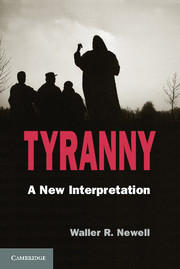Book contents
- Frontmatter
- Contents
- Acknowledgments
- Introduction
- 1 Is There an Ontology of Tyranny?
- 2 The Tyrant and the Statesman in Plato's Political Philosophy and Machiavelli's Rejoinder
- 3 Superlative Virtue, Monarchy, and Political Community in Aristotle's Politics
- 4 Tyranny and the Science of Ruling in Xenophon's Political Thought
- 5 Machiavelli, Xenophon, and Xenophon's Cyrus
- 6 Glory and Reputation
- 7 The Republic in Motion
- Conclusion
- Epilogue
- Bibliography
- Index
2 - The Tyrant and the Statesman in Plato's Political Philosophy and Machiavelli's Rejoinder
Published online by Cambridge University Press: 05 May 2013
- Frontmatter
- Contents
- Acknowledgments
- Introduction
- 1 Is There an Ontology of Tyranny?
- 2 The Tyrant and the Statesman in Plato's Political Philosophy and Machiavelli's Rejoinder
- 3 Superlative Virtue, Monarchy, and Political Community in Aristotle's Politics
- 4 Tyranny and the Science of Ruling in Xenophon's Political Thought
- 5 Machiavelli, Xenophon, and Xenophon's Cyrus
- 6 Glory and Reputation
- 7 The Republic in Motion
- Conclusion
- Epilogue
- Bibliography
- Index
Summary
This chapter centers on Plato's most explicit discussion of the possibility that a young tyrant's “eros” for the city might be harnessed to the Athenian Stranger's prescription in the Laws for founding a just regime (709–712). This is the classic statement of the relationship between an ambitious young ruler and the philosopher who should act as his mentor, a relationship echoed in many later works such as Cicero's depiction of Scipio the Younger and in his own real-life (and unsuccessful) attempts to govern the young Octavian Caesar. I then proceed to present Machiavelli's very different interpretation of this rubric in chapter 23 of The Prince on the need to avoid “flatterers,” in order to show how, in his evaluation, a prince's methodical exercise of will can do away with the need for this philosophical governor, in effect enabling the prince to become the source of his own prudence.
Before turning to the Laws, I begin with some general observations about the theme of tyranny in classical political thought. The ancient understanding of tyranny involves both psychological and theoretical dimensions, as well as considerations of pragmatic statecraft, and all three dimensions must be kept in play if we are to penetrate it. At bottom, the ancients, as I suggested in the Introduction, distinguish between two types of tyranny. The first is ordinary “garden variety” tyranny based on selfish passion and excess; its need for condemnation is straightforward, and its correction lies in the proper education of eros and thumos within a harmonious soul grounded in a cosmology of balance and moderation.
- Type
- Chapter
- Information
- TyrannyA New Interpretation, pp. 81 - 140Publisher: Cambridge University PressPrint publication year: 2013



